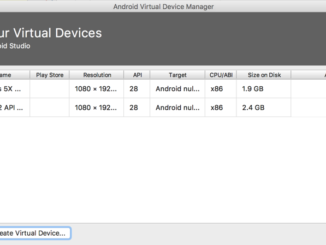
AWS Amplify를 이용한 Android 앱 개발 실습 – 2부
AWS Amplify를 이용한 Android 앱 개발 실습 – 2부 이 글은 AWS Amplify 개발 도구를 사용하여 AWS 클라우드 기반 Android 모바일 앱을 제작하는 방법에 대한 실습 시리즈입니다. 이 글에서는 1부에 이어 Android 앱에 고급 기능을 추가합니다. 다루는 내용은 다음과 같습니다. 기능 업데이트 : AWS AppSync API 오프라인 지원 데이터 변경(변형)에 대한 구독 사용 Amazon S3를 통한 객체 스토리지 활성화 사전 조건 Android 프로젝트를 작성하려면 워크 스테이션에 Java JDK가 설치되어 있어야 합니다. Android Studio를 다운로드하여 설치하고 Android SDK 관리자에서 Android 6.0 SDK(API 레벨 23 이상)를 다운로드합니다. 또한 에뮬레이터 이미지도 다운로드합니다. 이를 위해 Android Studio에서 AVD Manager를 선택해야 합니다. + Create Virtual Device를 선택하고 지침에 따라 설치를 완료합니다. 1 부에서 계속 1부에서 우리는 애완 동물의 목록을 표시하고 새로운 애완 동물을 추가할 수 있는 Android 앱을 만들었습니다. 새 애완 동물을 추가하면 앱은 다음과 같은 형태가 됩니다. 최적 업데이트 및 오프라인 지원 최적 업데이트 [ more… ]


